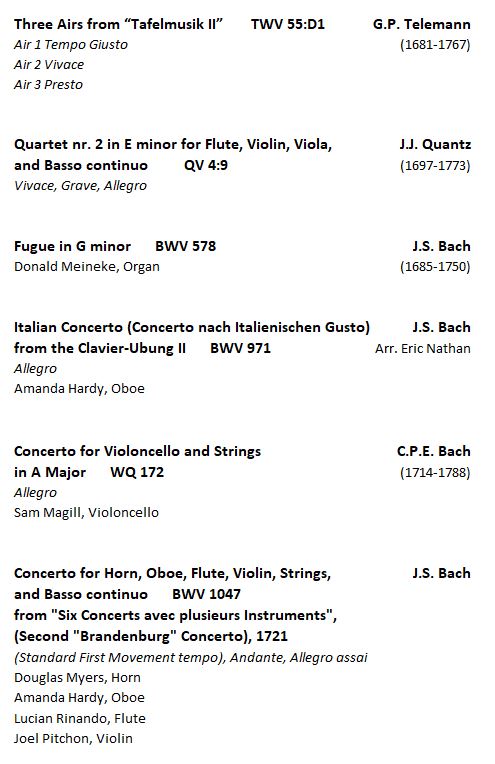Short Explanation of why the Second Brandenburg Concerto is for Horn, not Trumpet
There has been a big misunderstanding in the music world about which brass instrument should play in the Second Brandenburg Concerto. For years the standard approach has been to play it on the trumpet, but today we are performing it for you as Bach intended, on the French Horn. The main difference between the choice of the two instruments is that the horn version sounds one octave lower and is of a darker timbre.
When a new instrument springs into existence, such as the French Horn did around 1700, the number of names it is called is many. The nomenclature is developed by popular use and eventually after around 50 years the name settles down to a standard that all use. It is interesting to note that a parallel nomenclature developed with the English Horn, which was also suddenly invented around the same time. There are parallel misunderstandings and confusion abounds.
When the horn first appeared, it was imported from France by Count Anton Von Spork, a Czech nobleman and music enthusiast. From medieval times trumpets existed throughout Europe, used as signal instruments for night watchmen and guards to notify citizens of foreign invaders and other hazards. When someone first saw a French Horn, their reaction was naturally to call it a round trumpet from France. The horns in France have been used as a signal instrument in the new sport of hunting. So many names were used to describe the first French Horns in the rest of Europe. Handel called them “tromba da caccia” and Telemann used the term “tromba selvatica” (trumpet of the woods, i.e. hunting).
The confusion about the name of the horn in the Second Brandenburg Concerto all leads back to the fact that Bach chose the term tromba to list the instrument in his score. This is but one of many confusing issues that the passing of time has created. Later however when Bach performed the piece in Leipzig with the Musicum Collegium the actual part that the player used said “tromba o vero corne da caccia” (translated trumpet or truly hunting horn, clarifying the misunderstanding that had previously existed).
This was first brought to the music world’s attention in 1953 by Thurston Dart, Distinguished Professor of Music at Cambridge University. Almost 30 years had passed since Bach has first used the term tromba, whether he meant tromba da caccia or tromba selvatica we will never know. His small omission has caused much confusion which continues to the present day.
I researched this issue and found that there was simply no way it could be written for the trumpet. As a symphonic trumpet player at the time, I was deeply disappointed. There was no trumpet player at Cothen to play the part and no visiting trumpet players. No one has ever found an F trumpet made at that time so that no instrument existed on which to play it. All the facts point to the horn as the instrument intended.
In any event this is a fantastic piece of music and we are certain you will enjoy listening to it.
Douglas Myers
Artistic Director The New Baroque Soloists


No comments:
Post a Comment
Note: Only a member of this blog may post a comment.